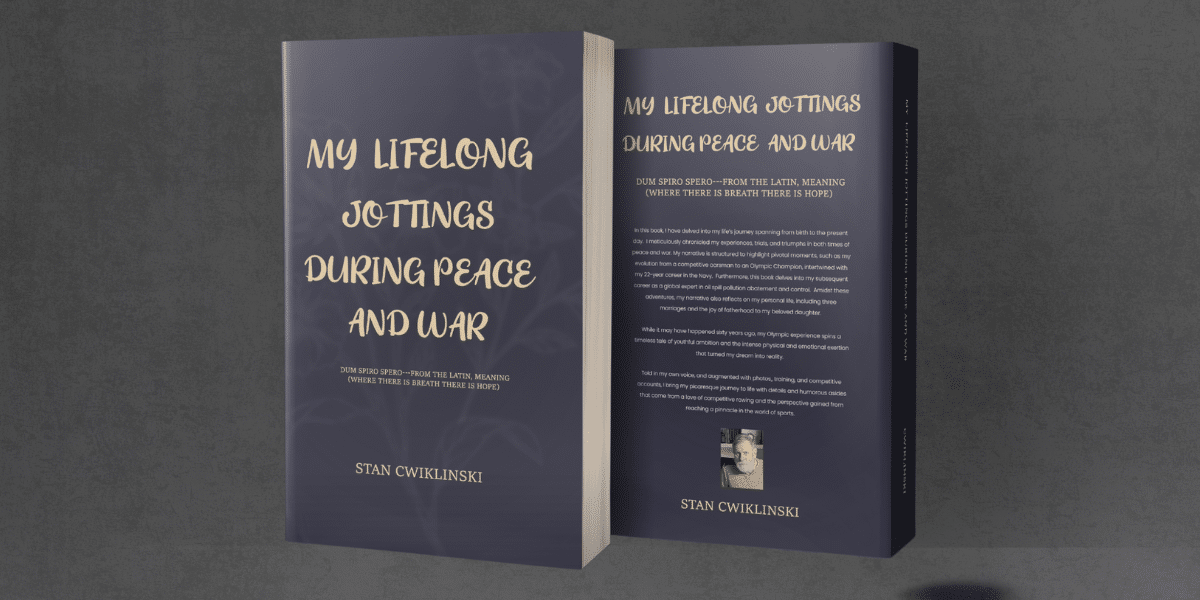Stan Cwiklinski’s life story is nothing short of remarkable. His memoir, My Lifelong Jottings During Peace and War, tells a journey that spans everything from Olympic glory to intense military service and environmental crisis management. It’s a deeply personal reflection on the experiences that shaped him, blending anecdotes, newspaper clippings, and photographs into a compelling narrative. His story is one of determination, resilience, and service — all wrapped into one captivating memoir.
Cwiklinski was brought up in Philadelphia, and his early life, like many boys of his generation, was filled with dreams. His dream, however, was rooted in the waters of the Schuylkill River, where he found his passion for rowing. It didn’t take long for his natural athleticism and determination to set him apart. By the early 1960s, he was competing as an oarsman for the Vesper Boat Club, one of the most prestigious rowing clubs in the U.S.
His rowing career culminated in an unforgettable moment in 1964 when he helped lead the U.S. men’s eight to victory at the Tokyo Olympics. Competing against the reigning champions, the German Ratzeburg Crew, the odds were stacked against Cwiklinski’s team. But on the Toda racecourse, in front of the world, the U.S. crew powered to an incredible victory. Cwiklinski’s memoir brings this achievement to life, describing not only the physical effort and team unity it took to win but also the euphoric celebrations afterward. It was a moment of national pride and personal triumph that set the stage for the next chapter of his life.
But rowing was only the beginning. Shortly after his Olympic success, Cwiklinski joined the U.S. Navy with the ambition of becoming a jet pilot. Fate, however, had other plans. When his dream of flying jets didn’t materialize, Cwiklinski found himself taking command of a NASTY-class fast patrol boat during the Vietnam War. He wasn’t just navigating the waters of Southeast Asia — he was navigating the complexities of war.
Vietnam was a turning point for Cwiklinski. As a boat skipper, he led his crew on coastal combat patrols, engaged in small craft interdictions, and carried out stealthy jungle insertions and extractions of special forces troops. Some of these missions were conducted in conjunction with the CIA and were classified as TOP SECRET until recently. In his memoir, Cwiklinski reflects on the intensity of these operations — the constant pressure, the risks, and the bonds formed with his crew. His experiences during this time would leave a lasting mark on him, shaping his understanding of leadership, service, and sacrifice.
After returning from Vietnam, Cwiklinski continued his service in the Navy, but this time his focus shifted underwater. He qualified as a U.S. Navy Deep Sea Diver and Special Operations Warfare Officer, becoming an expert in diving, salvage, explosive ordnance disposal, and mine warfare. The training was grueling — fifteen months of specialized courses followed by real-world operational experience. But Cwiklinski excelled, proving himself in some of the most challenging environments imaginable.
His work as a Navy diver was groundbreaking. He participated in hundreds of dives under extreme conditions, from murky waters with zero visibility to the high-pressure depths of 1,800 feet below the ocean’s surface. Using state-of-the-art technology, Cwiklinski was involved in everything from submarine rescue operations to the development of new diving and salvage equipment. His expertise was so valued that he spent three and a half years working with the Royal Navy in the United Kingdom under the Department of Defense’s International Personnel Exchange Program. There, he contributed to major advancements in diving procedures and technology.
On land, Cwiklinski took on high-level staff roles, managing operational taskings for the fleet and overseeing training programs. His final position in the Navy was as the Atlantic Fleet’s Oil Spill and Cleanup Response and Training Officer. Little did he know that this role would lead him to one of the most defining moments of his post-military career.
In 1989, the Exxon Valdez supertanker struck Bligh Reef in Alaska’s Prince William Sound, causing one of the worst environmental disasters in history. The oil spill devastated the surrounding ecosystem, and the cleanup operation that followed was massive. Cwiklinski was called in as a project manager and oil spill specialist. His background in diving and salvage made him the perfect candidate to lead efforts in containing and cleaning up the spill. His leadership during this crisis was crucial, and his memoir reflects on the complexity of managing such a large-scale environmental disaster.

But his work didn’t stop with the Exxon Valdez. Cwiklinski continued to respond to oil spills worldwide, including one at the U.S. Palmer Research Station in Antarctica. His expertise in environmental management and cleanup was sought after by governments and organizations across the globe.
After decades of service, both in the military and the environmental sector, Stan Cwiklinski finally retired. Today, he lives in Fallbrook, California, a peaceful town north of San Diego, with his wife, Royalyn La Valle, and his stepson, Rory. His life, as documented in My Lifelong Jottings During Peace and War, is a testament to the power of perseverance, adaptability, and commitment to serving something greater than oneself.
In his memoir, Cwiklinski not only chronicles his personal achievements but also highlights the importance of teamwork, leadership, and resilience. His story offers readers an intimate look at the challenges and triumphs that shaped him — from his days on the Schuylkill River to the battlefields of Vietnam, from the depths of the ocean to the oil-streaked waters of Alaska. It’s a story of a man who has truly lived, in both peace and war, and who has left a lasting impact on the world around him.
Published By: Aize Perez

















